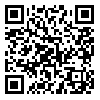Volume 15, Issue 10 (March 2013)
J Arak Uni Med Sci 2013, 15(10): 21-32 |
Back to browse issues page
1- , a_bayati@arakmu.ac.ir
Abstract: (9121 Views)
Background: Considering the importance of the presence of volunteer health care communicators and the reduction in their cooperation with health centers or their breaking off their communication in recent years, this study was done to explore the educational needs of health care communicators and their instructors. Materials and Methods: In a qualitative study, data were obtained through focus group discussions (FGDs) and individual depth interviews (IDIs) for need assessment from three groups of active volunteer health care workers, inactive volunteer health care workers and health instructors. In total, 14 FGD and 5 DII were held to cover the aims of research chosen by aimed sampling. The analysis was carried out by qualitative content analysis. Results: Three major themes emerged from data analysis, including the concepts of soft and hard tools (time, space, educational tools, and educational content), educator (teaching methods, awareness, and skills), and learner (application, literacy, experience learning level, and motivation). Conclusion: Many of the educational needs of the health care communicators and their educators had not been met which, in many cases, had led to the discontinuation of their cooperation with health centers. Hence, presenting the obtained feedback to officials for meeting their needs can be an effective measure in improving the activities of the communicators and their continuous presence in the health care system.
| Rights and permissions | |
 |
This work is licensed under a Creative Commons Attribution-NonCommercial 4.0 International License. |


